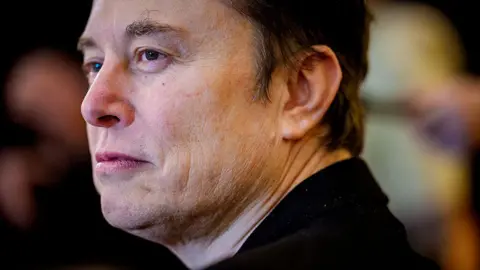Tesla Motors, the electric vehicle giant, has issued a strong denial regarding speculation that it has reached out to recruitment firms to find a successor for its CEO, Elon Musk. This response was triggered by a report from the Wall Street Journal that suggested Tesla’s board commenced a search for Musk’s replacement last month due to mounting frustrations over his diversions into political roles and the company’s declining stock prices.
The Wall Street Journal, a major U.S. publication, suggested that the tensions surrounding Musk’s engagement with his duties in the administration of former President Donald Trump were prompting the investigation into alternative leadership. The publication claimed that the board’s dissatisfaction rooted itself in perceptions of Mr. Musk’s preoccupation with matters outside the company, potentially impacting Tesla’s ongoing business dynamics.
In reaction to these assertions, Tesla categorically refuted them as being “absolutely false” in a statement released on Thursday. Musk himself took to his social media platform, X, to criticize the journal’s reporting, insinuating that it undermined the integrity of journalism by presenting misleading information. The CEO’s public defense reflects Tesla’s commitment to Musk’s leadership during a time when investor confidence may seem shaky.
Tesla’s chair, Robyn Denholm, reiterated Musk’s pivotal role as CEO in a post on X, clarifying that the company had not engaged any headhunters for this purpose. Denholm emphasized that the board expressed complete assurance in Musk’s ability to lead Tesla moving forward, especially as it embarks on a critical growth trajectory.
Notably, the denial from Tesla came amidst allegations detailed by the Wall Street Journal which highlighted that board members had expressed concerns about Musk’s divided focus. They reportedly urged him not only to dedicate more time to Tesla but also to communicate this intention publicly. The Journal claimed that Musk did not actively contest this feedback.
In a recent earnings call, Musk mentioned his intention to allocate more of his time to Tesla, thus hinting at a possible shift toward prioritizing his responsibilities at the company over external engagements. However, despite Musk’s forthcoming statements, his sentiments expressed via X on Thursday conveyed his outrage over the reporting from the Wall Street Journal. He labeled the article as a significant ethical violation, criticizing the publication for not presenting the board’s unequivocal denial prior to unleashing the story.
Adding another layer to Musk’s challenges at Tesla are the protests and backlash stemming from his controversial leadership role within the Department for Government Efficiency (popularly abbreviated as “Doge”) set up during the Trump administration. Critics have voiced their dissatisfaction, leading some customers to feel alienated from the Tesla brand due to Musk’s political affiliations and public pronouncements.
Consumers have expressed their discontent through various avenues, including boycotts and protests against Tesla, with reports of some incidents resulting in vandalism aimed at Tesla dealerships. This backlash complicates the company’s public perception and presents challenges regarding customer loyalty in an increasingly competitive automotive market.
With the discourse surrounding Elon Musk becoming intensely entwined with the company’s performance and public reception, Tesla’s strategy moving forward seems to hinge on reaffirming the strength of its leadership while navigating the turbulent interplay of politics and business that Musk’s dual roles entail. The unfolding drama raises questions not only about Tesla’s future but also about Musk’s capacity to effectively balance varying demands amid rising scrutiny from industry analysts and corporate stakeholders alike.



